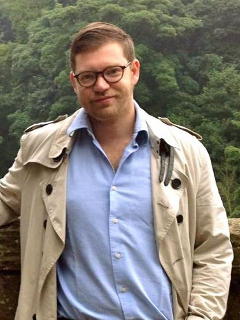Kit Kowol is Historian in Residence at The Corporate Theatre. Kit received his BA and MA from Durham University and recently completed a doctorate in Politics at the University of Oxford. His research, which focuses on rediscovering radical political thought in twentieth century Britain, has been published and presented widely. He has previously been a visiting scholar at the University of California, Berkeley and a guest lecturer for the Copenhagen Business School.
Alongside his academic career Kit has been active in policy development and analysis and has undertaken historically informed research for the National Endowment for Society Technology and the Arts (NESTA) and for the Reuters Institute for the Study of Journalism (RISJ).
At The Corporate Theatre he works to place trends in business and society in historical perspective and to use examples from the past to inspire leaders in the present. He is particularly interested in how the concept of citizenship can be employed by and for organizations.
Kit lives in Oxford and is currently Lecturer in History at Christ Church College.
Q&A
When and where do you feel most inspired?
As a historian I spend a lot of time in archives. Surrounding myself in papers that chronicle the minutiae of someone’s everyday life—from forgotten diet tips enclosed in a diary to angry underlinings in an old newspaper—reminds me that the people are always real, living, breathing humans with their own private passions and despairs. It is that which inspires me to continue studying the past and trying to use it to help shape the future.
What can we learn from History?
History’s real power is revealing how different the present could have been. It stops us from taking for granted the things we thinks of as being ‘natural’ or ‘permanent’—including everything from why we love coffee so much to how businesses are organised—and show us that in fact they are the product of very specific circumstances and moments in time.
What is in it for business?
Learning that the world could have been a very different place inspires us to try and change it. History teaches us that as much as any group business leaders—from Henry Ford to Joseph Rowntree—have frequently been at the forefront of economic, social, and political change. There is no reason that this change has to stop now!
As a historian, which leader do you find most inspirational?
It is always going to be hard to look past Winston Churchill. His ability to inspire people through his wartime broadcasts is an amazing example of the incredible power of storytelling. Less well know where his other non-political activities. He wrote novels, painted watercolours, was a keen gardener and even relaxed by brick-laying!
What is ‘Citizenship’ and why should companies embrace it?
Citizenship is about being a member of a community and having rights and responsibilities in that community. It is a relationship based on reciprocity and participation rather than a transactional ‘take it or leave it’ approach. Treating people as citizens and enabling them to help shape the decisions that affect them builds relationships of trust and enables collaboration. In an era when companies increasingly need to work with their customers to create and promote their products and when one bad decision can shatter your reputation treating stakeholders as citizens is vital to success.
Tell me something about you that nobody knows?
I experimented with a career in dry-stone walling (no it wasn’t inspired by Churchill).

